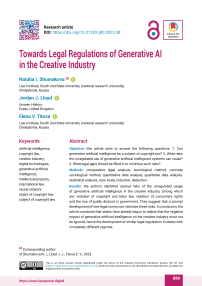Towards Legal Regulations of Generative AI in the Creative Industry
Автор: Shumakova N. I., Lloyd J. J., Titova E. V.
Журнал: Journal of Digital Technologies and Law @lawjournal-digital
Статья в выпуске: 1 (4), 2023 года.
Бесплатный доступ
Objective: this article aims to answer the following questions: 1. Can generative artificial intelligence be a subject of copyright law? 2. What risks the unregulated use of generative artificial intelligence systems can cause? 3. What legal gaps should be filled in to minimize such risks? Methods: comparative legal analysis, sociological method, concrete sociological method, quantitative data analysis, qualitative data analysis, statistical analysis, case study, induction, deduction. Results: the authors identified several risks of the unregulated usage of generative artificial intelligence in the creative industry, among which are: violation of copyright and labor law, violation of consumers rights and the rise of public distrust in government. They suggest that a prompt development of new legal norms can minimize these risks. In conclusion, the article constants that states have already begun to realize that the negative impact of generative artificial intelligence on the creative industry must not be ignored, hence the development of similar legal regulations in states with completely different regimes. Scientific novelty: the article provides a comprehensive study of the impact of generative artificial intelligence on the creative industry from two perspectives: the perspective of law and the perspective of the industry. The empirical basis of it consists of two international surveys and an expert opinion of a representative of the industry. This approach allowed the authors to improve the objectivity of their research and to obtain results that can be used for finding a practical solution for the identified risks. The problem of the ongoing development and popularization of generative artificial intelligence systems goes beyond the question “who is the author?” therefore, it needs to be solved by introduction of other than the already existing mechanisms and regulations – this point of view is supported not only by the results of the surveys but also by the analysis of current lawsuits against developers of generative artificial intelligence systems. Practical significance: the obtained results can be used to fasten the development of universal legal rules, regulations, instruments and standards, the current lack of which poses a threat not only to human rights, but also to several sectors within the creative industry and beyond.
Artificial intelligence, copyright law, creative industry, digital technologies, generative artificial intelligence, intellectual property, international law, neural network, object of copyright law, subject of copyright law
Короткий адрес: https://sciup.org/14128451
IDR: 14128451 | УДК: 34:004:34.096:347.211:004.8 | DOI: 10.21202/jdtl.2023.38


